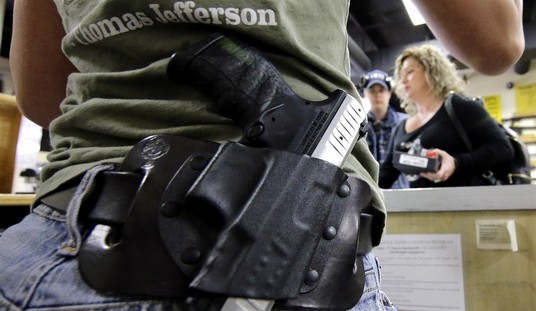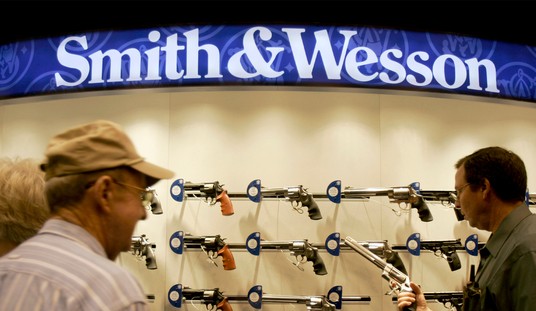I remember when I first wrote about Bret Weinstein. He was a biology professor and Evergreen State College who outraged the progressive mob because he dared ask a question. There was an event where all white people were told to stay home and he took issue with it, not because he disagreed with the attempted message, but that he thought there was a better way to send that message.
For that, activist students wanted his head.
Through all of that, though, he stayed fairly liberal.
However, he also recently became one of the millions of new gun owners in this country, and he has some interesting thoughts on being a liberal and supporting gun ownership.
At the beginning of the pandemic, I was out hunting for supplies, running through scenarios and planning for contingencies. I found myself at a local gun shop, where a line of edgy patrons stretched out the door and down the block. It’s not the kind of place my high school self would have imagined my middle-aged self would frequent. I am, after all, an American liberal, and American liberals, as a rule, believe that our founders (fresh from a war they won with muzzle-loaded weapons) left us in a terrible mess with respect to modern guns.
Decades ago I changed my position on the issue of “gun control”. Even though I still believe liberals are correct about the unfortunate predicament created by our founders, I now hold that we must tolerate privately held guns and all that comes with them. That may sound like a paradox, but once you understand the tensions internal to the mind of an armed American liberal, you will understand something fundamental about the American experiment.
…
To understand why private guns may be decisive in a fight against tyranny, let’s take a moment to revisit what is assuredly the most inscrutable section of the United States Constitution, the Second Amendment: “A well regulated Militia being necessary to the security of a free State, the right of the people to keep and bear Arms, shall not be infringed.”
It’s almost like a deliberate non-sequitur. In fact, after decades of pondering the question, I’m now fairly convinced that that is exactly what the founders gave us: an intentionally vague pronouncement designed to force the question into the future, to ensure it would be repeatedly reevaluated to keep up with changing weaponry and circumstances. Near as I can tell, it’s a place holder for a principle they could not tailor in advance.
They clearly didn’t want to give the legislature or the courts complete latitude. They tied our hands; our representatives are not allowed to disarm the public, even if a majority desires it. And the founders gave us a strong hint about why — something about the need to protect a “free state” from, you know… stuff. But they didn’t tell us how much firepower citizens should be allowed to have. And thank goodness they didn’t, because muzzle-loaded weapons are no better a model of modern weapons than a movable-type printing press is for an algorithmically personalised infinite scroll.
Obviously, I agree with Weinstein on this last bit.
However, it’s interesting how Weinstein is able to argue that liberals are somehow correct about the Second Amendment leaving us a mess and still recognize that it serves an important role in keeping our society free.
We can debate whether or not he’s right about it leaving us in a mess–I tend to think that restrictions on firearms don’t really impact the criminal element in this country to any appreciable degree, but it does hurt our ability to resist those criminals–but the second part of his position is absolutely accurate.
Here’s another bit from Weinstein:
As a young man I regarded the second amendment as the founders’ biggest blunder. As we head into 2022, my position has flipped — I now believe history may well come to regard it as the most far-sighted thing the founders did, not in spite of its vagueness, but because of it. It’s like a mysterious passage from a sacred text that forces living people to interpret it in a modern context. The founders believed the people needed to be able to defend their free state — with deadly force — whether that refers to a geographical state, or a state of being, or both.
Now, it appears that Weinstein ascribes to the Constitution as a “living document” way of thinking, which I vehemently reject, but there are a lot of people who think as he does, and that’s important to remember.
See, when a liberal like Weinstein talks about how he changed his thinking on guns, that becomes something we should all listen to. It’s something we should all pay very close attention to, even.
You see, if you’re not a liberal, you don’t think like a liberal. That means it’s difficult to argue with a liberal in a way that might change their mind. Sure, the die-hard anti-gunners aren’t likely to change, but there are a lot of people who are really on the fence and can be swayed. Those are your target audience.
Screaming about originalism and how “shall not be infringed” works really well in your typical Second Amendment circles, but if someone isn’t an originalist, that argument isn’t going to do much of anything. You’re not going to pierce the bubble that surrounds them.
But listening to a liberal talk about why they support the Second Amendment, you can understand why they do and find arguments that are far more likely to work on liberals than “shall not be infringed.”
Don’t get me wrong, I actually believe in “shall not be infringed.” I think it was put there for a reason and pretty much every gun control law in the nation violates the Second Amendment because of that. The thing is, I already support the Second Amendment. You don’t have to convince me.
You need to convince others, and Weinstein provides some interesting thoughts on the mind of a gun-owning liberal. I encourage you to read the whole thing. He doesn’t get everything right–Weinstein has his blinders, much like everyone else–but he ends up in more or less the right place.








